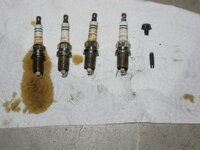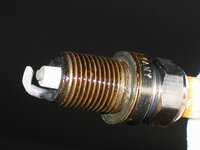- :
- Protege5 2003
I changed the spark plugs today. Out with the Bosch plugs, in with NGK BKR5E-11 plugs. I'm going to call the cylinders 1->4, numbered left -> right as one faces the engine from the front of the car. That's the same order they are shown in the first attachment. Sorry if that isn't standard numbering. There were a few little problems, but the only one that really concerns me is number 2 below. Anybody know what might be causing that? The motor had been off for about 20 hours when the plugs were changed.
1. Some rodent had been on the motor, chewed part of the insulation off the wire connecting to the coil pack on cylinder 4, and left some dandy rock hard baked on rodent poop behind the plug wire for cylinder 3.
2. The plug that came out of cylinder 1 had a lot of oil on the threads, but the nut and insulator were not oily. The tip of that plug looked about like all the others. This plug is shown close up in the second attachment. The brownish gunk on the insulators (on all plugs) may be cooked dielectric grease, it isn't oil, or at least not liquid oil.
3. It seems like NGK does not suggest using anti-seize with the BKR5E-11 plugs, at least the first time they are put in, so I didn't use any, just dielectric grease on the insulator and connector.
4. The rightmost bolt on the coil pack on cylinder 4 snapped in half while being screwed in. I was using a ratchet, but not applying significant force at the time. All of a sudden the ratchet started free wheeling. Luckily the bolt snapped off with about 2 mm of metal sticking up above the valve cover, so I was able to screw it out just using needle nose pliers. 0/4 local Mazda dealers carry that bolt, and all said it would take two days to order one. (I assume their mechanics have a secret stash of bolts, because they must break some, and the parts departments never have any.) Eventually I found one at a shop in Covina that does a lot of Mazda work, and he was kind enough to give it to me for free. The snapped bolt is presented for your viewing enjoyment at the right of the first image.
5. The left most bolt holding the coil on cylinder 2 had a white corroded tip. Not the thread part, but the little unthreaded narrower part at the very tip the bolt. I reused it anyway, since I didn't have a spare bolt (see above). What would make a bolt corrode from the bottom up??? If there was a hole in the bottom of that "tube" in the valve cover, would that do it?
1. Some rodent had been on the motor, chewed part of the insulation off the wire connecting to the coil pack on cylinder 4, and left some dandy rock hard baked on rodent poop behind the plug wire for cylinder 3.
2. The plug that came out of cylinder 1 had a lot of oil on the threads, but the nut and insulator were not oily. The tip of that plug looked about like all the others. This plug is shown close up in the second attachment. The brownish gunk on the insulators (on all plugs) may be cooked dielectric grease, it isn't oil, or at least not liquid oil.
3. It seems like NGK does not suggest using anti-seize with the BKR5E-11 plugs, at least the first time they are put in, so I didn't use any, just dielectric grease on the insulator and connector.
4. The rightmost bolt on the coil pack on cylinder 4 snapped in half while being screwed in. I was using a ratchet, but not applying significant force at the time. All of a sudden the ratchet started free wheeling. Luckily the bolt snapped off with about 2 mm of metal sticking up above the valve cover, so I was able to screw it out just using needle nose pliers. 0/4 local Mazda dealers carry that bolt, and all said it would take two days to order one. (I assume their mechanics have a secret stash of bolts, because they must break some, and the parts departments never have any.) Eventually I found one at a shop in Covina that does a lot of Mazda work, and he was kind enough to give it to me for free. The snapped bolt is presented for your viewing enjoyment at the right of the first image.
5. The left most bolt holding the coil on cylinder 2 had a white corroded tip. Not the thread part, but the little unthreaded narrower part at the very tip the bolt. I reused it anyway, since I didn't have a spare bolt (see above). What would make a bolt corrode from the bottom up??? If there was a hole in the bottom of that "tube" in the valve cover, would that do it?


